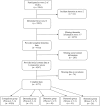Social engagement before and after dementia diagnosis in the English Longitudinal Study of Ageing
- PMID: 31369590
- PMCID: PMC6675105
- DOI: 10.1371/journal.pone.0220195
Social engagement before and after dementia diagnosis in the English Longitudinal Study of Ageing
Abstract
Background: Social engagement protects against dementia onset. Less is known about patterns of social engagement around the time of dementia diagnosis. We investigated face-to-face and telephone contact at three times (pre-diagnosis, at report of diagnosis, 2 years post-diagnosis) in individuals who developed dementia and a comparison group.
Methods: Social engagement was assessed at waves 2-7 of the English Longitudinal Study of Ageing in 4171 individuals aged 50 and older. Dementia was ascertained by either self-reported physician diagnosis or through an informant evaluation of a participant's functional and cognitive performance compared with a few years earlier. Generalized estimating equations were used to examine differences by group, time, and group-by-time interactions.
Results: The dementia group reported less face-to-face (p < 0.001) and telephone contact (p < 0.001) than the dementia-free group pre-diagnosis. The dementia group experienced greater reductions in social engagement leading up to dementia diagnosis and in the 2 years following diagnosis (p's < 0.001).
Conclusion: Given that social engagement reduces dementia risk and supports the lived experience of people with dementia, it is important to find ways of promoting social interaction in older adults.
Conflict of interest statement
The authors have declared that no competing interests exist.
Figures



References
Publication types
MeSH terms
LinkOut - more resources
Full Text Sources
Medical

